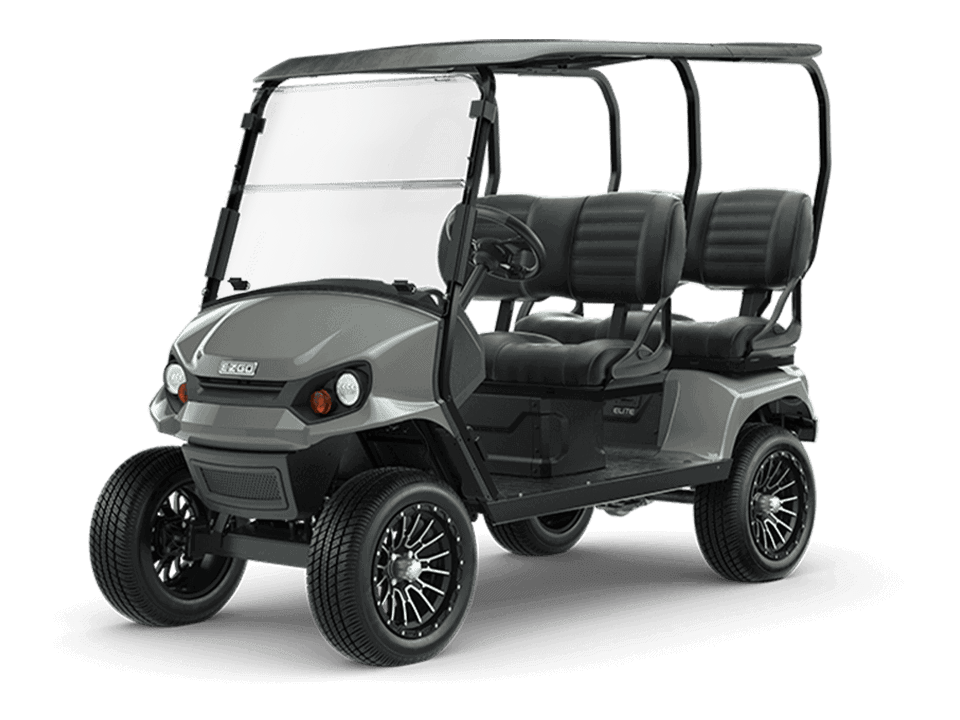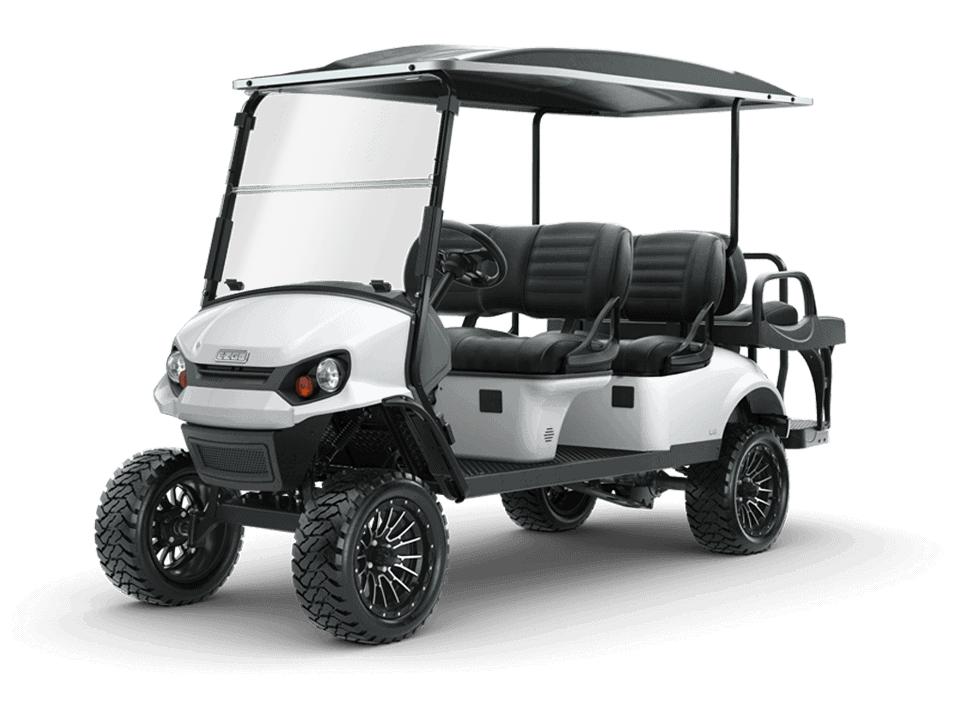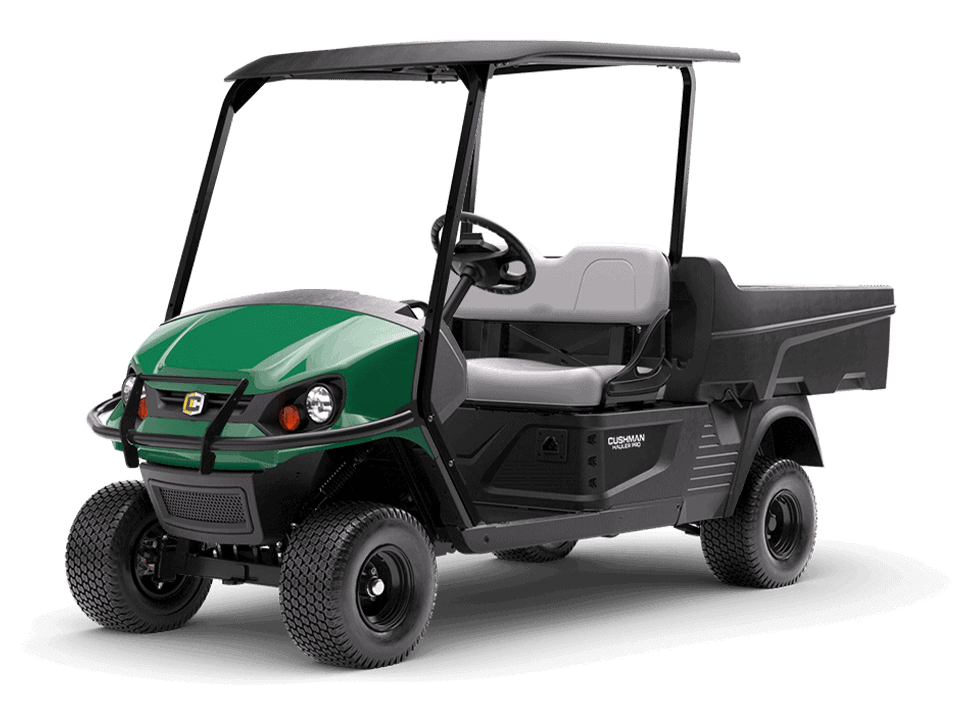
Taking Your Golf Cart Off-Road? — Here’s What You Need to Know
February 19, 2025
How Long Do Electric Golf Cart Batteries Last?
March 12, 2025Does your industrial facility rely on on-site transportation? The most common industrial vehicles are usually trucks, forklifts, and tractors. But have you ever thought about golf carts for industrial use?
Golf carts are becoming increasingly popular in industrial settings due to their efficiency, low emissions, easy maintenance, and ability to navigate large spaces. Whether for transporting personnel, equipment, or supplies, they offer a practical alternative to traditional vehicles.
In this guide, we’ll explore the benefits of using golf carts in industrial environments, discuss common types of golf carts for industrial use, and share tips for commercial golf cart fleet management.
Why Are Golf Carts Valuable in Industrial Settings?
Industrial golf carts are transforming facility operations through a unique combination of practical advantages that directly impact the bottom line. Their value extends beyond simple transportation, offering three strategic benefits that enhance overall operational efficiency:
Efficiency & Speed
When it comes to workflow efficiency, industrial golf carts excel in ways that traditional industrial vehicles can’t match. Like other industrial vehicles, golf carts can transport tools and materials, but they offer an additional advantage in workplace mobility — they can seat up to eight passengers, something most industrial vehicles cannot do. This allows facility teams to move multiple members at once, further reducing downtime, improving response times, and keeping operations running smoothly.
In addition, golf carts are lighter, smaller, and easier to handle than trucks or forklifts, allowing them to operate seamlessly in tight spaces where larger vehicles might struggle. This makes them especially useful in facilities where space is limited, but quick and reliable transportation is still necessary.
Cost-Effectiveness
Compared to full-size industrial vehicles like trucks or forklifts, golf carts are a more affordable transportation solution. They require less fuel (or electricity), have lower maintenance costs, and do not need as much storage space.
Sustainability
Electric golf carts are a sustainable alternative to traditional fuel-powered industrial vehicles. Electric models produce zero emissions, helping companies reduce their carbon footprint while maintaining a productive workflow.
Common Industrial Applications
The adaptability of industrial golf carts makes them valuable across diverse industrial settings:
- Warehouses
- Distribution Centers
- Manufacturing Plants & Factories
- Construction Sites
- Industrial Parks
Types of Golf Carts for Industrial Use
When selecting golf carts for industrial use, understanding the key differences between available options is crucial for making an informed decision that aligns with your facility’s specific needs. Let’s explore the main variations and their distinct advantages.
Standard vs. Utility Golf Carts
Standard golf carts, originally designed for golf courses, have evolved to meet basic industrial transportation needs, but utility golf carts offer a significant upgrade. These models come equipped with cargo beds, tool racks, and even enclosed cabins, making them versatile and durable for demanding industrial environments. While standard carts are suitable for transporting passengers and light cargo, utility carts are built with heavy-duty components, including reinforced frames and stronger suspensions, allowing them to handle loads over 1,000 pounds.
When it comes to hauling and towing, the difference is substantial. Standard golf carts typically max out at around 800 pounds, which works for a few passengers or light equipment. However, utility vehicles are rated for up to 18,000 pounds, with specialized axles and drivetrains designed for heavy materials and equipment. This enhanced capacity makes them invaluable for moving heavy materials, equipment, or larger groups of personnel across industrial facilities.
Gas vs. Electric Golf Carts
The choice between gas and electric golf carts depends on the specific demands of your industrial facility. Gas-powered golf carts offer greater range and power, making them ideal for large sites, off-road terrain, and applications requiring heavy loads or towing capacity. However, they require more maintenance and produce emissions, which may not be ideal for indoor or environmentally conscious operations.
On the other hand, electric golf carts are a cost-effective and eco-friendly alternative, producing zero emissions and requiring less maintenance. They are perfect for warehouses, factories, and enclosed industrial spaces where air quality and noise levels are a concern. While their battery life limits range and may require downtime for charging, advancements in lithium-ion batteries have significantly improved performance.
Acquiring & Managing a Golf Cart Fleet in an Industrial Setting
Incorporating golf carts into your industrial operations requires careful consideration of both acquisition methods and long-term management strategies. Understanding these aspects will help you maximize the return on your investment while ensuring optimal fleet performance.
Purchasing vs. Renting Golf Carts for Industrial Use
The choice between owning and renting your industrial golf cart fleet can significantly impact your operational efficiency and financial resources. Each option offers distinct advantages and considerations that should align with your business objectives and resources.
| Buy | Rent | ||
|---|---|---|---|
| Financial Considerations | Total Upfront Costs | Higher upfront cost with a substantial down payment (golf cart financing options are often available) |
Lower upfront cost provides financial relief |
| Total Costs | Greater financial liability with long-term expenses; potential for higher returns over the vehicle’s lifespan | Costs spread flexibly over the rental period, providing cash flow advantages; may surpass purchase pricing | |
| Recouping Costs | Opportunity to recoup costs through resale | No option for recouping costs through resale | |
| Ownership Considerations | Customization | Complete freedom for customizations | Limited customization options |
| Maintenance | Control over maintenance schedules; ongoing upkeep costs | Routine service often included in agreements; maintenance is managed by the rental provider | |
| Flexibility | No contractual limitations on usage or specified service providers | Access to the latest models facilitates fleet replacement; valuable for expanding or contracting fleets based on demands |
- Whichever option you choose, ensure that the golf carts comply with OSHA’s 1926.601 regulation, which governs motor vehicles operating on off-highway job sites (not open to public traffic). This regulation outlines the necessary safety features for each type of vehicle, ensuring compliance and workplace safety.
Ongoing Fleet Management
Proper fleet maintenance is essential to keeping industrial golf carts reliable, safe, efficient, and compliant with workplace safety standards.
Key maintenance practices include:
- Brake Check: Periodically inspect the brakes for wear and tear. If you notice any unusual noises or reduced braking efficiency, have them examined by a professional.
- Light & Signal Inspection: Ensure all lights, turn signals, and headlights function properly. Replace bulbs or address any electrical issues promptly.
- Regular Cleaning: Keep your golf cart clean by washing it regularly to prevent dirt and grime buildup, which can affect its appearance and performance.
- Tire Inspection: Check your tires for proper inflation and signs of wear and tear. Ensure all tires are adequately inflated to the manufacturer’s recommended PSI levels to maintain appropriate handling and safety. You should check the tire pressure on the vehicle about once a month.
- Fluid Levels Check: Regularly check and top up essential fluids, such as brake fluid and coolant, to ensure your golf cart’s systems function optimally. As part of this check, inspect any fluid leaks, which may indicate an issue with the vehicle’s systems. Address any leaks promptly to prevent further damage.
Choosing the Best Industrial Golf Cart for Your Needs
When selecting golf carts for industrial use, it’s essential to choose vehicles that:
- Align with Budget & Financial Planning: Whether purchasing or renting, ensure the investment fits within your budget and long-term cost strategy.
- Meet Your Operational Needs: Select models with the right customizations (cargo beds, enclosed cabins, towing capabilities) to enhance workflow.
- Provide Long-Term Reliability: Consider maintenance needs, durability, and compliance with OSHA regulations to ensure workplace safety and performance.
At Garrett’s Golf Cars, we offer flexible commercial rental services, an extensive catalog of E-Z-GO and Cushman industrial vehicles, and comprehensive maintenance solutions to keep your fleet running smoothly. Whether you’re looking to purchase, rent, or service industrial golf carts, our team is here to help you find the best fit for your needs.
Contact us today to explore your options, and let us help you build a fleet that enhances efficiency and reliability at your industrial facility.








